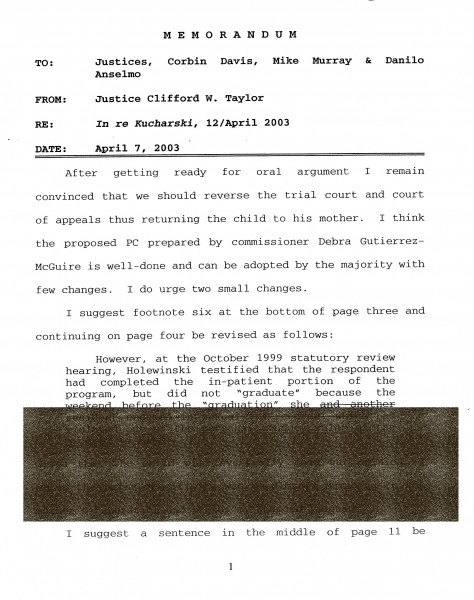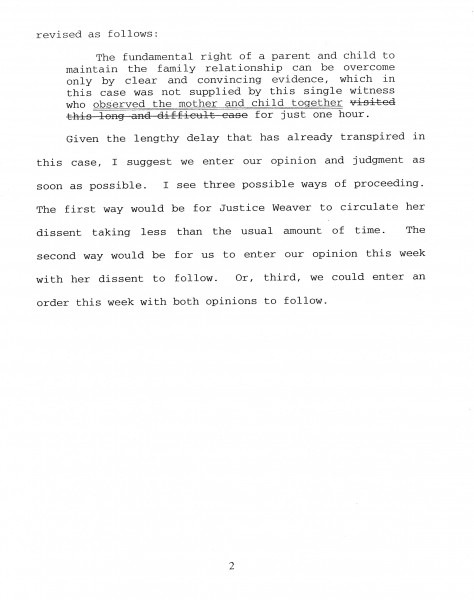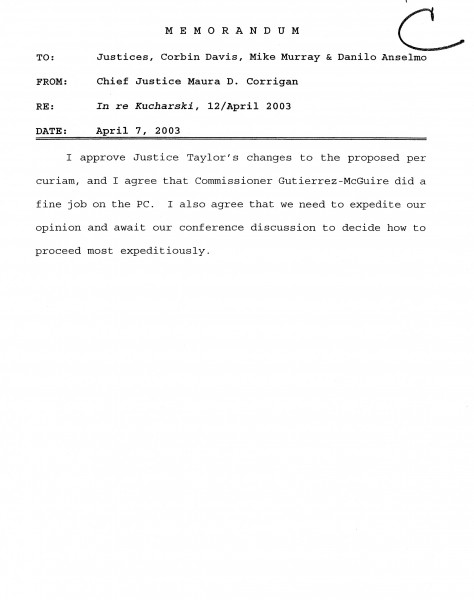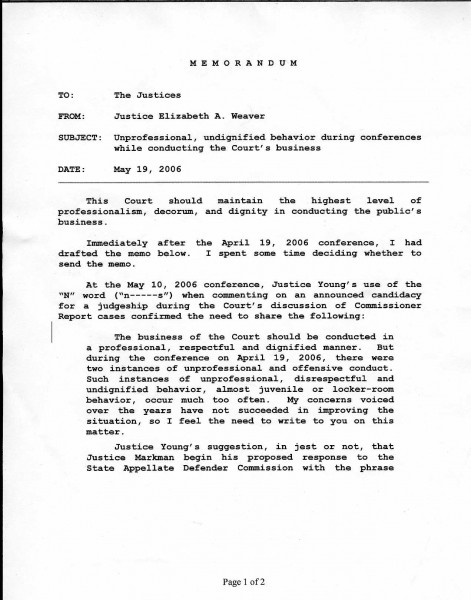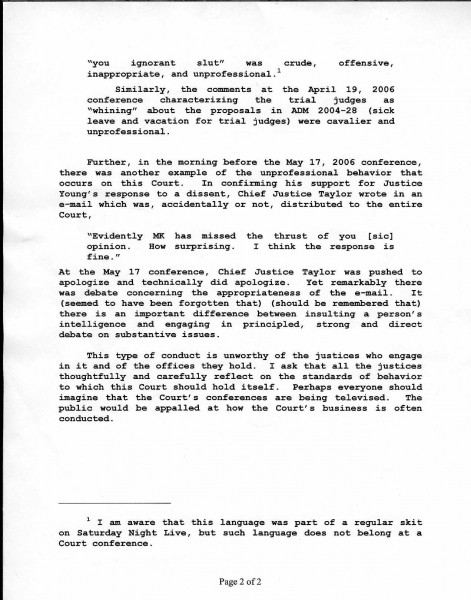Let us assume that Associated Press reporter Ed White got it down correctly. …That Michigan Supreme Court Justice Robert Preston Young, Jr., has acknowledged that he uttered the dread N-word–that remnant of racism–in a moment of high passion. According to Mr. White:
Young, who is black, told the Associated Press that he used the word during an “impassioned plea” to emphasize how someone was being treated “without rights, without dignity.”
“I’m sorry that I used the term. … Obviously I was very hot about this. That’s why I used the word,” Young said. “I remember the heat and the purpose for using it.”
When pressed for details, he couldn’t recall the case.
How about if I help him refresh his memory? Michigan Supreme Court Justice Elizabeth A. Weaver (Retired) remembers clearly what, where, when and how he said it. Here is her response to Justice Young’s assertions.
STATEMENT BY MICHIGAN SUPREME COURT JUSTICE
ELIZABETH A. WEAVER (RETIRED)
October 25, 2010
Last week, on Oct. 19, 2010, in a speech now on the internet (www.delayedjustice.com , YouTube, and my personally funded websitewww.justiceweaver.com) I shared with the public that Justice Robert P. Bob” Young, Jr. and Judge Mary Beth Kelly, and their media supporters are repeatedly misleading and deceiving the voting public with incorrect assertions about their performance, temperament, and character as judges.
As examples, I publically shared seven (7) facts–not fictions–about Justice Young. The first was that Justice Young used at least one racial slur while performing the business of the court during the regular Court Conference of May 10, 2006. I read from my May 19, 2006, memo to the Justices concerning the unprofessional, disrespectful, undignified, almost juvenile and locker-room behavior that occurred much too often while doing the judicial business of the people in regular Supreme Court conferences.
The memo stated:
At the May 10, 2006, conference, Justice Young’s use of the N” word (n—–s”) when commenting on an announced candidacy for a judgeship during the Court’s discussion of Commissioner Report cases confirmed the need to share the following:”
And I then went on to lay out other examples of bad conduct. You can read the entire memo at the two websites.
Justice Young, in an interview with Associated Press reporter Ed White, confirmed that he had used the N” word. Unfortunately, he didn’t stop there. He attempted to deceive the reporter and the public by saying that he used it during an ‘impassioned plea’ to emphasize how someone was being treated ‘without rights, without dignity.’” Justice Young continued that Obviously I was very hot about this. That’s why I used the word. … I remember the heat and the purpose for using it.”
The article stated that, When pressed for details, he [Justice Young] couldn’t recall the case.”
Below are the details and the truth–not the fiction–about the case and the conduct of Justice Young during the case while the Court was holding its regular weekly conference to discuss the status of pending cases. He used the N” word with disdain and jocularity…he was laughing. And so were others. His statement was made during the business of the Court. The justices were in the middle of item number seven (7) on the May 10, 2006, court conference agenda: 130592 Moxon v. Moxon. The trial judge in the case was Judge Antonio Tony” Viviano. The Justices had been discussing whether to deny appeal in the case, hear it, or remand it. The Justices turned from the case before them to bring up that Judge Tony Viviano’s son, David, might run for a judgeship in Macomb County and that might put him in the running against a former judge, Andrea Ferrara. The Supreme Court had removed Judge Ferrara from office in Wayne County in 1998 but there was talk of her running for another judgeship in Macomb County in the 2006 election.
Below is exactly what the Justices said, from my notes and from a transcript of a recording I made of that conference. I share these facts for the voting public to judge for themselves whether Justice Young is fit to continue to serve on the Michigan Supreme Court:
7.130952 STELLA A MOXON V JACK R MOXON –
Chief Justice Clifford W. Taylor (CWT): I’M QUICK TO SAY THE JUDGE ALWAYS HAS THE RIGHT TO CHANGE THINGS WITH REGARDS TO THESE KIDS.”
Justice Marilyn Kelly (MK): I THINK SO TOO EVEN THOUGH THAT WAS A SEPARATE…”
Chief Justice Clifford W. Taylor (CWT): ..BUT I JUST WANT TO REMAND THIS FOR FURTHER FACT FINDING CAUSE I DON’T THINK HE HAD ENOUGH IN THERE TO JUSTIFY DOING WHAT HE DID.”
Justice Robert P. Young (RPY): THE SALE WAS PENDING…”
Justice Michael F. Cavanagh (MFC): VIVIANO’S SON WAS RUNNING…”
Chief Justice Clifford W. Taylor (CWT): …ANDREA FERRARA. ISN’T THAT A SCREAM? … YES, THAT’S WHAT SHE SAID. MOVING ON…”
Justice Robert P. Young (RPY): WATCH OUT FOR THOSE N—–S OUT THERE. (Laughter) REALLY . . .”
Chief Justice Clifford W. Taylor (CWT): …WE DIDN’T DO THE DEATH PENALTY…”
Justice Michael F. Cavanagh (MFC): SHE HAS TO MOVE FROM DOWN RIVER OUT TO MACOMB.”
Justice Robert P. Young (RPY): SHE DID.”
Chief Justice Clifford W. Taylor (CWT): OH, I’M SURE SHE DID.”
Justice Robert P. Young (RPY): I THOUGHT SHE LIVED IN…”
Chief Justice Clifford W. Taylor (CWT): SHE MOVED ACROSS 8 MILE, BOB.”
Justice Robert P. Young (RPY): I THOUGHT SHE LIVED IN THE POINTS. HER FAMILY LIVES OVER THERE. MAYBE THERE’S A FERRARA DOCTOR THAT’S HER DAD I THINK…”
Chief Justice Clifford W. Taylor (CWT): …LET’S SEE WHERE WE ARE HERE.”
Justice Robert P. Young (RPY): ALL RIGHT (laughs). I’M A DENY. STEVE, I DIDN’T HEAR FROM YOU.”
Justice Stephen J. Markman (SJM): I DON’T THINK TONY (Judge Antonio Viviano) EVEN INVOKED MCR 2.612. I’D FEEL A LOT MORE COMFORTABLE IF WE REMANDED, HAD THEM AT LEAST GO THROUGH THE STEPS.”
Chief Justice Clifford W. Taylor (CWT): I GUESS MAURA (Justice Maura D. Corrigan (MDC)) …”
Justice Elizabeth A. Weaver (EAW): WHAT WAS MAURA’S VOTE?”
Chief Justice Clifford W. Taylor (CWT): SHE WAS A DENY.”
Justice Elizabeth A. Weaver (EAW): SO, THAT’S FOUR, RIGHT?”
Identity of speaker unclear: THERES A SPECIFIC COURT RULE AND THE COURT JUST TOTALLY IGNORED IT, MARILYN.”
Justice Marilyn Kelly (MK): I’M WILLING TO DO THIS . . .”
Chief Justice Clifford W. Taylor (CWT): IT’S A FACT QUESTION. I MEAN THE FEDERAL…”
Justice Elizabeth A. Weaver (EAW): RIPPY (RPY), I THOUGHT YOU WERE A DENY.”
Justice Robert P. Young (RPY): I AM.”
Justice Elizabeth A. Weaver (EAW): SO, IT’S YOU, MYSELF, MK, AND MDC, RIGHT?”
Justice Robert P. Young (RPY): RIGHT.”
Chief Justice Clifford W. Taylor (CWT): BUT I THINK PEOPLE ARE STILL THINKING ABOUT IT.”
Justice Elizabeth A. Weaver (EAW): I DIDN’T KNOW.”
Chief Justice Clifford W. Taylor (CWT): SO, DO YOU WANT TO TALK ABOUT IT ANYMORE?”
Justice Marilyn Kelly (MK): I’M DONE.”
Chief Justice Clifford W. Taylor (CWT): SO IT’S A DENY.”
Justice Robert P. Young (RPY): I’LL REMAND.”
Justice Elizabeth A. Weaver (EAW): 3-4 to deny.”
——————————————————————-
That’s the conclusion of Justice Weaver’s Statement.
At a seminar earlier this month, a speaker reflected on the career of scholar/teacher/editor George Panichas. Panichas is the author of many books, including The Courage of Judgment and the Modern Age. Here’s what the orator said: The courage of judgment, the willingness to call things by their right names, is desperately needed.”
And what shall we call this?

